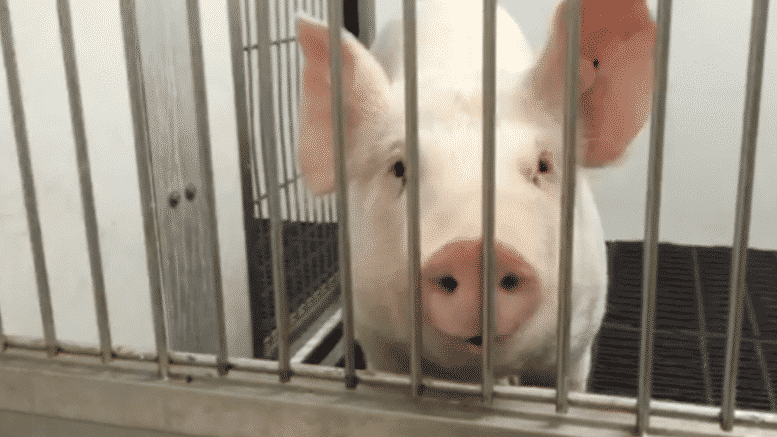This means that genetic research will be a complete free for all. It probably will have to be. I know that this does not make anyone comfortable.
It does mean that ethical niceties will be mostly ignored. Those may come as the technology matures and it is all better understood.
Think in terms of Frankenstein unleashed. This is no longer an impossibility.
.
Genetic Engineering In China Is Exploding
https://www.technocracy.news/genetic-engineering-in-china-is-exploding/
As
Technocracy in China matures, all moral and ethical restraints have
been removed. Every conceivable type of life based on DNA is now open to
genetic editing. In other words, China is taking over life itself. ⁃ TN
Editor
Inside a fortress-like megafarm on the outskirts of Beijing, dozens of pink-and-black pigs forage and snooze, unfazed by the chilly spring air. These experimentally bred hogs are fortified with a gene for regulating heat, buffering them against northern China’s hypothermia-inducing winters.
Inside a fortress-like megafarm on the outskirts of Beijing, dozens of pink-and-black pigs forage and snooze, unfazed by the chilly spring air. These experimentally bred hogs are fortified with a gene for regulating heat, buffering them against northern China’s hypothermia-inducing winters.
The gene that researcher Jianguo Zhao inserted into the pigs’ DNA is
among dozens of examples of genetic engineering underway in China—and in
rival laboratories across the world—to create super pigs. For years,
the quest was for better-tasting, stronger, and faster-growing swine.
Now, in the wake of a devastating global outbreak of African swine
fever, the more crucial need is to safeguard food security, and keep
hogs alive.
“The most burning question for scientists is how to make the pig more
healthy,” says Zhao, 45, who heads a 20-strong group of researchers and
technicians at the state-run Chinese Academy of Sciences’ Institute of
Zoology in Beijing, where he’s become a superstar in the world of swine
genomics.
China’s ambitions, though, extend well beyond farm animals. In dozens
of labs across the country, scientists are racing researchers in the
U.S. and Europe to develop superior lines of food and fiber crops, while
others are pushing the boundaries of medical science—sometimes facing
criticism—by editing the human genome to correct disease-causing
mutations or susceptibility to infections like HIV.
“The most burning question for scientists is how to make the pig more healthy”
It’s a biotechnology arms race happening against the backdrop of a
disruptive trade war with the U.S., a rapidly aging population, and
diminishing resources to feed China’s 1.4 billion people. Soaring
pork prices prompted the State Council, China’s cabinet, in September to
call for the greater use of science and technology, among other
measures, to boost production of the country’s staple meat.
Read about how Chinese parents use DNA tests to map out their babies’ lives.
China’s investment in research and development has already catapulted
the world’s most populous nation from relative obscurity in biomedical
science to behemoth in less than two decades.
China outspends every other country barring the U.S. on research and
development—$445 billion in 2017. Chinese firms have also stepped up
acquisitions of foreign biotechnology and pharmaceutical companies, with
$25.4 billion in deals since the start of 2014, according to data
compiled by Bloomberg.
But teams in the U.S. and Europe currently have a critical edge,
including something China desperately needs: protection from major
pig-killing diseases.
China has sought to redress that by sending
abroad promising scientists, like Zhao, to learn from the world’s best,
then bringing them home and furnishing them with industrial-scale
resources. The campus that houses Zhao’s gene-edited pigs is ring-fenced
by three layers of security checkpoints and can accommodate 4,000 hogs.
“The powerhouse these days is China,” said Simon Lillico, 47, a
scientist at the University of Edinburgh’s historic Roslin Institute,
where Dolly the sheep became the first mammal cloned from an adult cell
in 1996. “They are spending so much money and throwing so much resource
at science that we can’t even come close to competing with the amount of
money that they are investing in this sort of science, so we need to be
smart about what we do.”
China’s market for biologic drugs and agricultural biotechnology
remains a fraction of the U.S.’s estimated $228 billion industry, but
the upsurge in Chinese investment is already causing anxiety in
Washington. In July, the U.S.-China Economic and Security Review
Commission pledged to investigate the potential risks of America’s
growing reliance on Chinese biotechnology and medicines.
Of concern “is the potential for the U.S. to become dependent on
China for important pharmaceuticals or other health-care technologies,”
said Mark Kazmierczak, a molecular biologist with consulting
firm Gryphon Scientific who wrote a report on the industry for the U.S.
security review panel. “China’s access to personal information of U.S.
citizens, including DNA sequence data, also poses privacy concerns.”
Our reporter took DNA tests in the U.S., and China. Read about why the results concerned her.
Zhao, who grew up in rural Shandong province, embodies the zeal with
which China is pursuing genomics, the science of analyzing an organism’s
complete DNA sequence. After receiving his doctorate in animal genetics
and breeding from an agricultural university in Harbin in 2003, he
worked for a few years as an assistant researcher at a medical genetics
institute in Shanghai.
Techniques for modifying genomes were slow at the time, he recalls.
To expedite his research, he headed to the University of New Orleans a
few months after Hurricane Katrina hit in 2005 to train under
reproductive physiologist Barry Bavister. Decades earlier, work by
Bavister had led to the first successful in vitro fertilization of a
rhesus monkey, paving the way for the world’s first test-tube baby in
1978.

No comments:
Post a Comment